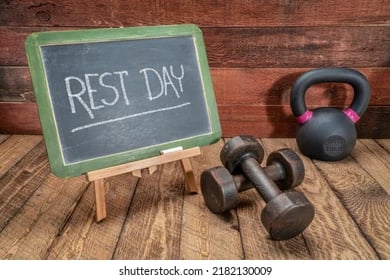The Importance of Rest and Recovery in Fitness
Discover the importance of rest and recovery in fitness. Learn how proper sleep, rest days, and recovery techniques can boost muscle growth, prevent injuries, and enhance performance
BEGINNER FITNESS TIPS
3/8/20253 min read


Why Rest and Recovery Matter
When it comes to achieving fitness goals, most people focus on intense workouts and strict training regimens. However, rest and recovery are just as essential for long-term progress.
Without adequate rest, your body doesn’t have the chance to repair and grow stronger, leading to fatigue, injury, and stagnation.
In this article, we’ll explore the importance of rest and recovery, how it impacts muscle growth, and the best strategies to incorporate into your fitness routine.
Understanding the Difference Between Rest and Recovery
While often used interchangeably, rest and recovery have distinct roles in fitness. Rest refers to taking a complete break from intense exercise, allowing the body to recharge. Recovery, on the other hand, includes active strategies such as stretching, hydration, proper nutrition, and low-impact movement.
Both play a crucial role in preventing burnout, reducing injury risk, and optimizing performance. By integrating structured rest and effective recovery methods, you can maintain consistency and achieve better fitness results.
The Science Behind Muscle Recovery
During strength training, microscopic tears occur in muscle fibers. The body repairs these tears through protein synthesis, making muscles stronger and more resilient. This process, however, requires time and adequate rest.
Growth hormone and testosterone, essential for muscle repair, are primarily released during deep sleep. Without sufficient recovery time, muscle breakdown exceeds muscle growth, leading to fatigue and decreased performance. To maximize muscle recovery, prioritize both rest days and proper post-workout nutrition.
The Impact of Sleep on Fitness and Performance
Quality sleep is one of the most overlooked aspects of fitness recovery. Sleep regulates hormones like cortisol (the stress hormone) and growth hormone, both of which impact muscle repair and fat metabolism. Studies show that sleep deprivation reduces strength, endurance, and cognitive function.
Aim for at least 7-9 hours of sleep per night to enhance muscle recovery, maintain a healthy metabolism, and improve overall athletic performance. Establishing a consistent sleep schedule and avoiding screens before bedtime can significantly boost recovery.
The Role of Nutrition in Recovery
Nutrition plays a pivotal role in muscle repair and overall recovery. Protein is essential for rebuilding muscle tissue, while carbohydrates replenish glycogen stores depleted during exercise. Healthy fats contribute to hormone regulation, further supporting recovery.
Hydration is equally important, as water helps transport nutrients to cells and flush out toxins. Ideal post-workout meals include lean proteins (chicken, fish, tofu), complex carbohydrates (quinoa, sweet potatoes), and healthy fats (avocados, nuts). By consuming a balanced diet, you accelerate recovery and maintain peak performance.
Active Recovery: How It Speeds Up Healing
Active recovery involves engaging in low-intensity movements that promote blood circulation without adding stress to the muscles. Activities like walking, yoga, and stretching help alleviate soreness and prevent stiffness.
Foam rolling and mobility exercises also enhance flexibility and reduce muscle tension. By incorporating active recovery into your routine, you improve circulation, reduce muscle stiffness, and stay consistent with your fitness goals.
The Risks of Overtraining and Insufficient Rest
Overtraining occurs when the body doesn’t get enough time to recover between workouts. Common signs include persistent fatigue, irritability, decreased performance, and an increased risk of injuries.
When the body is overworked, it releases excessive cortisol, which can hinder muscle growth and weaken the immune system. Scheduling regular rest days and listening to your body’s signals are crucial for long-term fitness success. Remember, more training doesn’t always mean faster results.
How to Structure Rest Days for Optimal Results
Rest days are vital for preventing burnout and promoting muscle recovery. The frequency of rest days depends on the intensity and type of training. Strength training enthusiasts typically benefit from taking 1-2 rest days per week, while endurance athletes may require more frequent recovery periods.
On rest days, focus on light activities such as stretching, foam rolling, or even a leisurely walk to keep your body moving without overexertion. Structuring rest days strategically can help maintain progress while preventing injuries.
Mental Recovery: The Mind-Body Connection
Physical recovery isn’t the only aspect of fitness that matters—mental recovery is equally important. Stress and mental fatigue can negatively impact motivation, performance, and overall well-being.
Practices like meditation, deep breathing, and mindfulness can help reduce stress levels and improve focus. Taking time for hobbies, socializing, and relaxing activities can also enhance mental recovery. A healthy mind supports a healthy body, making rest and recovery even more critical.
Common Myths About Rest and Recovery
There are many misconceptions surrounding rest and recovery. One common myth is that taking rest days leads to lost progress. In reality, rest days are essential for muscle growth and injury prevention. Another myth is that soreness equals an effective workout.
While some soreness is normal, excessive soreness may indicate overtraining or improper recovery. Debunking these myths can help individuals make informed decisions about their fitness routines and prioritize recovery without guilt.
Prioritizing Rest for Long-Term Success
Rest and recovery are fundamental components of a successful fitness journey. Prioritizing sleep, proper nutrition, hydration, and active recovery can enhance muscle growth, improve performance, and prevent burnout. Ignoring recovery can lead to setbacks, injuries, and decreased motivation.
By incorporating structured rest and effective recovery strategies, you ensure long-term success in your fitness journey. Take a moment today to plan your next rest day and implement recovery techniques that will help you stay strong and consistent in your workouts.
Passionate insights on fitness and nutrition topics.
info@thestrongplate.com
© 2024. All rights reserved.


